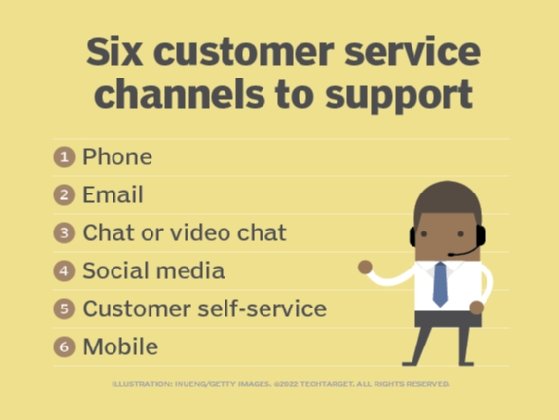
Getty Images/iStockphoto
5 examples of effective NLP in customer service
Through use cases such as chatbots, recommendation systems and customer relationship management, NLP and AI are playing an important role in enterprise customer service.
The study of natural language processing has been around for more than 50 years, but only recently has it reached the level of accuracy needed to provide real value. From interactive chatbots that can automatically respond to human requests to voice assistants used in our daily life, the power of AI-enabled natural language processing (NLP) is improving the interactions between humans and machines.
NLP is broadly defined as the automatic manipulation of natural language, either in speech or text form, by software. NLP-enabled systems aim to understand human speech and typed language, interpret it in a form that machines can process, and respond back using human language forms rather than code. AI systems have greatly improved the accuracy and flexibility of NLP systems, enabling machines to communicate in hundreds of languages and across different application domains.
Many organizations are seeing the value of NLP, but none more than customer service. Customer service support centers and help desks are overloaded with requests. NLP systems aim to offload much of this work for routine and simple questions, leaving employees to focus on the more detailed and complicated tasks that require human interaction. From customer relationship management to product recommendations and routing support tickets, the benefits have been vast.
Customer service chatbots
For many organizations, chatbots are a valuable tool in their customer service department. By adding AI-powered chatbots to the customer service process, companies are seeing an overall improvement in customer loyalty and experience.
Chatbots are able to operate 24 hours a day and can address queries instantly without having customers wait in long queues or call back during business hours. Chatbots are also able to keep a consistently positive tone and handle many requests simultaneously without requiring breaks.
Additionally, chatbots can be trained to learn industry language and answer industry-specific questions. These additional benefits can have business implications like lower customer churn, less staff turnover and increased growth.
Product recommendation conversational systems
Companies are also using chatbots and NLP tools to improve product recommendations. These NLP tools can quickly process, filter and answer inquiries -- or route customers to the appropriate parties -- to limit the demand on traditional call centers. Employees no longer need to be bogged down answering simple questions.
NLP in customer service tools can be used as a first point of engagement to answer basic questions about products and features, such as dimensions or product availability, and even recommend similar products. This frees up human employees from routine first-tier requests, enabling them to handle escalated customer issues, which require more time and expertise.
AI bots are also learning to remember conversations with customers, even if they occurred weeks or months prior, and can use that information to deliver more tailored content. Companies can make better recommendations through these bots and anticipate customers' future needs.

Customer sentiment analysis
NLP tools can also help customer service departments understand customer sentiment. Sentiment analysis -- the process of identifying and categorizing opinions expressed in text -- enables companies to analyze customer feedback and discover common topics of interest, identify complaints and track critical trends over time. However, manually analyzing sentiment is time-consuming and can be downright impossible depending on brand size.
Companies are now deploying NLP in customer service through sentiment analysis tools that automatically monitor written text, such as reviews and social media posts, to track sentiment in real time. This helps companies proactively respond to negative comments and complaints from users. It also helps companies improve product recommendations based on previous reviews written by customers and better understand their preferred items. Without AI-powered NLP tools, companies would have to rely on bucketing similar customers together or sticking to recommending popular items.
Customer satisfaction and trend spotting
Honest customer feedback provides valuable data points for companies, but customers don't often respond to surveys or give Net Promoter Score-type ratings. As such, conversational agents are being deployed with NLP to provide behavioral tracking and analysis and to make determinations on customer satisfaction or frustration with a product or service.
This customer feedback can be used to help fix flaws and issues with products, identify aspects or features that customers love and help spot general trends. For this reason, an increasing number of companies are turning to machine learning and NLP software to handle high volumes of customer feedback. Companies depend on customer satisfaction metrics to be able to make modifications to their product or service offerings, and NLP has been proven to help.
Support ticket routing
Customer and IT help desks are often overloaded. According to many market research organizations, most help desk inquiries relate to password resets or common issues with website or technology access. Autonomous NLP agents can help alleviate much of this load. Companies are using NLP systems to handle inbound support requests as well as better route support tickets to higher-tier agents.
NLP systems can understand the topic of the support ticket and immediately direct to the appropriate person or department. This can help reduce bottlenecks in the process as well as reduce errors.
AI-enabled customer service is already making a positive impact at organizations. NLP tools are allowing companies to better engage with customers, better understand customer sentiment and help improve overall customer satisfaction. As a result, AI-powered bots will continue to show ROI and positive results for organizations of all sorts. While there's still a long way to go before machine learning and NLP have the same capabilities as humans, AI is fast becoming a tool that customer service teams can rely upon.







